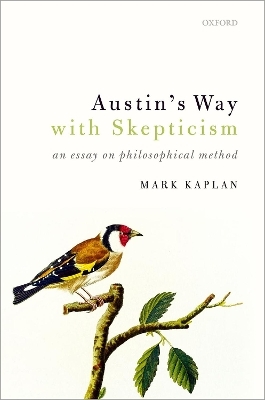
Austin's Way with Skepticism
An Essay on Philosophical Method
Seiten
2018
Oxford University Press (Verlag)
978-0-19-882485-5 (ISBN)
Oxford University Press (Verlag)
978-0-19-882485-5 (ISBN)
In Austin's Way with Skepticism, Mark Kaplan argues that J. L Austin's 'ordinary language' approach to epistemological problems has been misread. Contrary to the consensus view, Kaplan presents Austin's methods as both a powerful critique of the project of constructive epistemology and an appreciation of how epistemology needs to be done.
J. L. Austin is famous for writing as if he thought it a condition, on the adequacy of what we say while doing epistemology, that it accord faithfully with what we would say in ordinary circumstances. A durable consensus formed after Austin's death that his pursuit of epistemology faithful to 'ordinary language' was fundamentally misguided. While critics saw his methods as resulting from a failure properly to understand the nature of the epistemologist's project, Mark Kaplan argues that this consensus arose from a misreading of Austin. In Austin's Way with Skepticism: An Essay on Philosophical Method, he sets out his stance that both the condition of adequacy to which Austin was committed and his reason for being committed to it, have been misunderstood by his critics.
Starting by carefully analysing what Austin said about knowledge in 'Other Minds,' examining the response to skeptical arguments, and taking seriously the methodological remarks Austin scattered in his corpus, Kaplan demonstrates that Austin's methods were not born of a misunderstanding of the project of epistemology. Rather, Austin was a powerful critique of how that project has been conceived though was not against epistemological theorizing itself. Kaplan concludes that Austin understood himself to be offering substantive answers to key epistemological questions and defending a way of doing epistemology that is fully capable of providing these important answers.
J. L. Austin is famous for writing as if he thought it a condition, on the adequacy of what we say while doing epistemology, that it accord faithfully with what we would say in ordinary circumstances. A durable consensus formed after Austin's death that his pursuit of epistemology faithful to 'ordinary language' was fundamentally misguided. While critics saw his methods as resulting from a failure properly to understand the nature of the epistemologist's project, Mark Kaplan argues that this consensus arose from a misreading of Austin. In Austin's Way with Skepticism: An Essay on Philosophical Method, he sets out his stance that both the condition of adequacy to which Austin was committed and his reason for being committed to it, have been misunderstood by his critics.
Starting by carefully analysing what Austin said about knowledge in 'Other Minds,' examining the response to skeptical arguments, and taking seriously the methodological remarks Austin scattered in his corpus, Kaplan demonstrates that Austin's methods were not born of a misunderstanding of the project of epistemology. Rather, Austin was a powerful critique of how that project has been conceived though was not against epistemological theorizing itself. Kaplan concludes that Austin understood himself to be offering substantive answers to key epistemological questions and defending a way of doing epistemology that is fully capable of providing these important answers.
Mark Kaplan is Professor of Philosophy at Indiana University. He is the author of Decision Theory as Philosophy (Cambridge University Press, 1996). He has also written numerous articles and book chapters on the work of J. L. Austin, on epistemology, and on Bayesian decision theory (in particular, the philosophical motivation and epistemological import of that theory). His work has been supported by the American Council of Learned Societies and the National Science Foundation.
1: Austin's Critical Method
2: Austin as Theorist
3: Philosophical Detachment Revisited
4: How to do Things with Austin: The Lottery and the Preface
5: How to Do Things with Austin: Gettier's Challenge
6: Epistemology Austin's Way
Appendix: Appendix
| Erscheinungsdatum | 27.07.2018 |
|---|---|
| Verlagsort | Oxford |
| Sprache | englisch |
| Maße | 164 x 242 mm |
| Gewicht | 418 g |
| Themenwelt | Geisteswissenschaften ► Philosophie ► Erkenntnistheorie / Wissenschaftstheorie |
| Geisteswissenschaften ► Philosophie ► Philosophie der Neuzeit | |
| ISBN-10 | 0-19-882485-8 / 0198824858 |
| ISBN-13 | 978-0-19-882485-5 / 9780198824855 |
| Zustand | Neuware |
| Informationen gemäß Produktsicherheitsverordnung (GPSR) | |
| Haben Sie eine Frage zum Produkt? |
Mehr entdecken
aus dem Bereich
aus dem Bereich
Buch | Softcover (2023)
Reclam, Philipp (Verlag)
7,00 €
die Grundlegung der modernen Philosophie
Buch | Softcover (2023)
C.H.Beck (Verlag)
18,00 €
![Was heißt Denken?. Vorlesung Wintersemester 1951/52. [Was bedeutet das alles?] - Martin Heidegger](/media/113619842)

